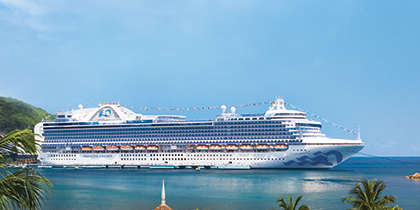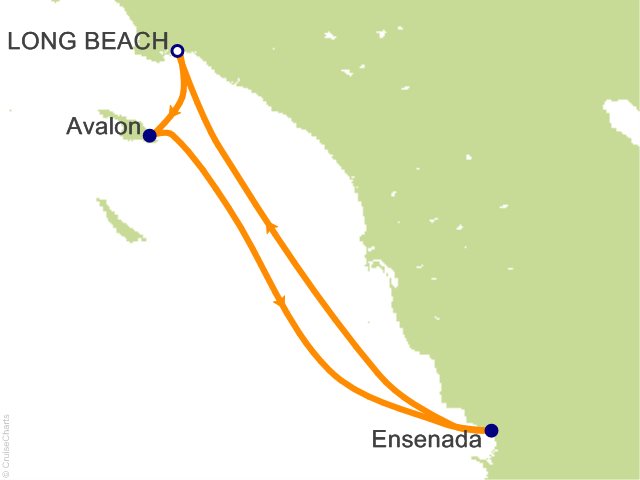
It is possible to work on cruise ships as a lifeguard and earn money. Many different cruise ship job opportunities are available. Each one requires a certain skill set and qualification.
One of the main benefits of working on a cruise ship is that you can take advantage of all that the Caribbean has to offer. See the world's most beautiful cities, islands and beaches from a new perspective. Enjoy a ton of free time while earning a good amount of money.
The career of a lifeguard aboard a cruise ship is full of challenges, but also many opportunities. You must be able handle the pressures of sea life and respond quickly in emergency situations. You will need to learn the latest protocol for crisis response and may be required to attend a large amount of mandatory training.

Finding a company you enjoy and getting an interview is the best way to begin a career as cruise line lifeguard. You can also find a recruiter to help you get in.
Disney, Carnival Cruise Lines, Norwegian and Princess Cruises are among the most popular. They have a family-oriented, fun atmosphere. They're also a lot easier to find your first contract with.
Crystal, Regent Seven Seas and Seabourn are more expensive. These cruise lines have more expensive itineraries, a more mature clientele and more luxurious ships. However, they are harder to sign up for.
Some cruise ships hire hospitality professionals with diverse backgrounds, in addition to lifeguards. The people who work in this position are well-versed in how to deal with guests. These people can be an asset to a cruise company, as they are responsible for welcoming passengers at the nightly shows, assisting them on the water slide, and providing shore excursion escorts.

It is normal to expect that you will spend your first few weeks aboard a cruise ship training. These courses include basic ship safety, lifeboat operations, evacuation protocol, crowd management, and more. Although stressful and exhausting they are important for your safety.
After your initial instruction, you will receive a job assignment and be required to fulfill your duties. It's your responsibility to ensure all swimmers are following the safety rules, as well ensuring that the pools and decks are safe and clean.
As a lifeguard on a cruise ship, you have to be able to communicate with guests and fellow crew members in a variety of languages. You'll have to attend translation courses if the language spoken on the ship is not your native tongue. While on the vessel, you will be required by law to take part in emergency drills. They may last for several hours and usually take place at the very end of each day.
FAQ
To go on a cruise, do you need to have a passport?
You need a passport to travel the world. A passport allows you to travel anywhere in the world without needing visas.
Without a passport, you might not be permitted to enter certain countries. It allows you longer stays abroad.
How can I choose the best cruise line?
It is simple to choose the right cruise line. First, choose the type of cruise that you wish to take. You might prefer a smaller intimate cruise, or one with many passengers. Consider how much you can afford. If you are looking for something more affordable, look for cruises that offer "all-inclusive" packages. This will mean that you won't need to pay extra for meals, drinks, entertainment or other amenities. Finally, if you plan on a family trip, ensure that the cruise lines you choose offer good family programs.
These are the 4 factors that determine the cruise's cost.
The main factors determining the price of a cruise are the length of time you want to spend on board, whether you would prefer an all-inclusive package, how many people you plan to take along, and what type of cabin you have booked.
What do you get on your cruise?
Fun is the most important thing. You don't have to do it all. Just enjoy the moment.
There are plenty of activities available for everyone. You can always talk to someone if you feel bored.
Cruising is about having fun and relaxing. It's not about doing everything possible to ensure you see as much as possible.
Many types of cruises are available, from short trips around Europe to longer voyages across the Pacific. The length of your trip will depend on the activities you plan to accomplish.
Statistics
- You'll need to budget around $80 per person per day for this option – and an additional 18% gratuity. (travel.usnews.com)
- The line estimates savings of 50% when you purchase this bundle. (travel.usnews.com)
- If you're traveling alone, you may also need to factor in a single supplement, adding up to as much as 100% of the cruise fare. (travel.usnews.com)
- You can save 15% off the total price if you book in advance of your trip. (travel.usnews.com)
External Links
How To
How can you plan your first cruise?
Planning a cruise is like planning any trip; there are many things to consider, such as where to go, what activities to include, budgeting, etc. When planning your first cruise, you should know some things to keep in mind if cruising is new to you. Cruises usually last for three weeks longer than land vacations, so make sure you leave nothing out. These tips will help you make your cruise even more enjoyable.
-
Book your cruise early. You should book at least 6 months in advance. This will allow you to get amazing deals and avoid the crowds. Additionally, you will have ample time for research on the ship, itinerary and ports as well as activities. You might even find a discount on your airfare!
-
Pick a destination. It doesn't really matter what port you choose, just choose one that appeals. There are many reasons that people love to cruising to other destinations. Some prefer to explore cities while others prefer to relax on board. Whatever your preferences, you should remember which destination you would like to visit. An island in the Caribbean is a popular choice, closely followed by Europe and Alaska.
-
Book a Suite - If money is not an issue, consider booking a suite. Suites include extra space, a private terrace, and additional amenities. These rooms are generally available for $100-$300 per evening, depending on how big your room is and if there are any suites available during your sailing date.
-
Check the weather forecast - Cruising is often associated with warm tropical climates. But, make sure to check the weather forecasts on the days you'll visit the ports. It is possible for the sea to be unpredictable, especially in Antarctica. Before you book your cruise, it is a good idea to check how severe the weather may be.
-
Take only 10 things on your cruise. You don't want to have a suitcase full of clothes and shoes. It's better to pack only what you actually need in small bags. Layer clothing, as you won't be able wash it at all on board.
-
Do your research. Before you buy tickets, make sure to read online reviews. It is important to understand what their cancellation policies are, as well as the pricing policies.
-
These must-see places are worth a visit. Each area has its own charms and culture so you should take advantage of every opportunity.